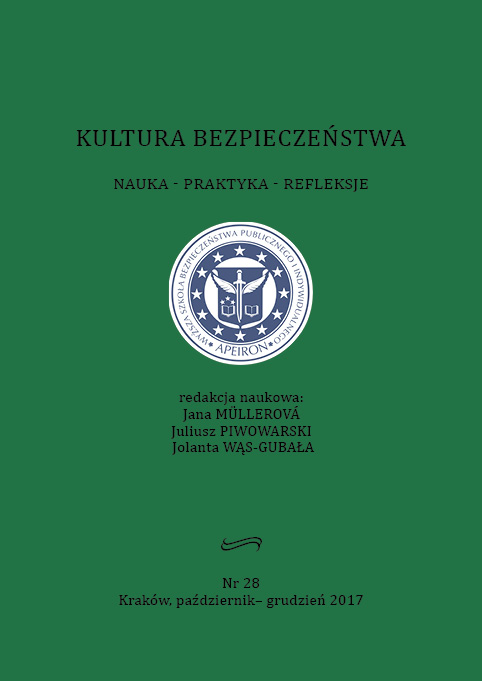Imiona i nazwiska człowieka w aspekcie bezpieczeństwa kulturowego
Names and Surnames from the Aspect of Cultural Security
Author(s): Wojciech M. HrynickiSubject(s): Security and defense, Cultural Anthropology / Ethnology, Identity of Collectives
Published by: Wyższa Szkoła Bezpieczeństwa Publicznego i Indywidualnego “Apeiron” w Krakowie
Keywords: security; cultural security; cultural identity; names and surnames;
Summary/Abstract: The objective of the article is to prove that names and surnames are connected with cultural identity and cultural security by demonstrating that both the motives for granting and the possibility of changing them are related with broadly understood culture and cultural identity, determined by customs, habits, tradition, common history and objectives, religion or language. Additionally, the aim of this article is to demonstrate that such a relationship may gradually loosen as a result of increasing globalization and migration of population. 2. Introduction Cultural security is determined by numerous cultural phenomena and is linked with cultural identity. It should be assumed that cultural security occurs on at least three subjective planes (individual, micro-group and macro-group) and two objective planes (national and social). It should also be assumed that the relationship between names and surnames, cultural identity and cultural security is visible both on the subjective plane (individual, micro-group and macro-group) and the objective one (social), for the existence of which notions such as nation, language, traditions, customs and habits, religion, are also of great significance. 3. Methodology The author considers the issue of names and surnames from the aspect of cultural security, following views on such topics and, in this respect, makes use of the intuitive method. It is also necessary to analyse individual legal acts relating to the giving of names and the changing of names or surnames, and to this end the author uses the formal and legal method. The historic method, thanks to which one may see how the views on names and surnames and corresponding regulations have changed, is also partly useful. All conclusions are based to a great extent on the author’s own research conducted for the years 2012–2015, which in turn is connected with the use of both the survey method and the interview method, as well as the statistical method. The surveys conducted concern the motives for naming children by parents, and the interviews were carried out in 84 registry offices in Poland (in the largest cities in Poland, according to the number of population). 4. Conclusions The author proves that names and surnames demonstrate a strong relationship with broadly understood culture and cultural identity, determined by customs, habits, tradition, common objectives, history, religion and language, and an affiliation with cultural security. At the same time, increasing globalization and migration of population will loosen this relationship, which may currently be observed in countries of Western Europe, where the influence of Islam has a significant impact on the culture and cultural identity of individual nations.
Journal: Kultura Bezpieczeństwa. Nauka-Praktyka-Refleksje
- Issue Year: 2017
- Issue No: 28
- Page Range: 66-93
- Page Count: 28
- Language: Polish

